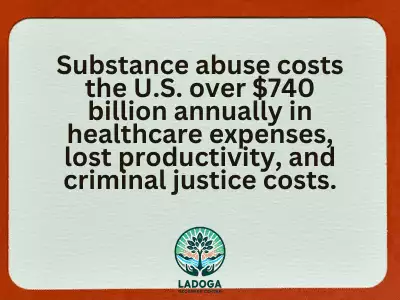Substance abuse can disrupt every aspect of an individual’s life, from physical health and emotional well-being to relationships and career stability. The journey to recovery is not just about stopping drug or alcohol use; it’s about rebuilding a life free from addiction. At Ladoga Recovery, we believe in offering comprehensive, evidence-based care that guides individuals from detox through long-term recovery, ensuring they have the tools and support necessary for lasting change.
This guide provides an in-depth look at what you can expect during each stage of Substance Abuse Treatment, including Detox Treatment, Residential Treatment, and Inpatient Treatment, as well as the transition to long-term recovery. Understanding these steps can empower individuals and their families to embrace the recovery process with confidence.
The Initial Stage: Detox Treatment
Why Detox is Crucial
Detoxification, or detox, is the critical first step in the recovery process. It involves clearing the body of drugs or alcohol and managing the physical symptoms of withdrawal. Detox is not a treatment for addiction itself but a preparatory stage that sets the foundation for further therapy and healing.
Detox Treatment is especially important because the withdrawal process can be both physically and emotionally taxing. In some cases, withdrawal symptoms can be severe or even life-threatening, particularly for substances like alcohol, benzodiazepines, or opioids. Under professional medical supervision, individuals can safely navigate this challenging phase.
What to Expect During Detox
- Assessment
Detox begins with a comprehensive evaluation. Medical professionals assess the individual’s physical health, substance use history, and any co-occurring mental health disorders. This information is used to develop a tailored detox plan that prioritizes safety and comfort. - Withdrawal Management
During detox, individuals experience withdrawal symptoms as their body adjusts to the absence of substances. Common symptoms include nausea, anxiety, sweating, tremors, and, in severe cases, seizures or hallucinations. Medical staff closely monitor individuals, providing medications and therapies to alleviate discomfort and prevent complications. - Stabilization
Once withdrawal symptoms are under control, the focus shifts to stabilization. This involves restoring physical health and preparing individuals mentally and emotionally for the next stages of treatment.
Detox Treatment is a short-term process, often lasting between 5 and 10 days, depending on the substance and the individual’s needs. It is a vital step that ensures individuals are ready to engage fully in the recovery process.
The Next Phase: Residential Treatment
What is Residential Treatment?
Residential Treatment provides a structured, supportive environment where individuals can focus entirely on their recovery. Unlike outpatient programs, Residential Treatment offers 24/7 care, making it an ideal option for those with severe addictions or unstable living situations. This level of care is designed to help individuals address the underlying causes of addiction, develop new coping strategies, and build a solid foundation for long-term recovery.
What to Expect During Residential Treatment
- Therapeutic Interventions
Residential Treatment employs a variety of evidence-based therapies to address the physical, emotional, and psychological aspects of addiction. These may include:- Cognitive Behavioral Therapy (CBT): Helps individuals identify and change negative thought patterns and behaviors.
- Dialectical Behavior Therapy (DBT): Focuses on emotional regulation and interpersonal effectiveness.
- Group Therapy: Provides a supportive environment where individuals can share experiences and learn from others.
- Daily Structure
A typical day in Residential Treatment includes therapy sessions, educational workshops, physical activities, and time for reflection. This structure helps individuals build healthy routines and practice self-discipline. - Holistic Therapies
Many programs incorporate holistic approaches like yoga, meditation, art therapy, or nutritional counseling to promote overall well-being. - Community Support
Residential Treatment fosters a sense of community among participants. Building relationships with others who share similar struggles can provide emotional support and motivation.
Residential Treatment typically lasts between 30 and 90 days, though some programs offer extended care for those who need additional support.
Inpatient Treatment: Intensive Support for Complex Needs
The Benefits of Inpatient Treatment
Inpatient Treatment is a more intensive form of care designed for individuals with severe addictions or co-occurring mental health conditions. This level of care is especially beneficial for those who have experienced relapses or who face significant challenges in maintaining sobriety.
What to Expect During Inpatient Treatment
- Integrated Care
Many individuals entering Inpatient Treatment have dual diagnoses, meaning they struggle with both addiction and a mental health disorder such as anxiety, depression, or PTSD. Inpatient programs provide integrated treatment that addresses both issues simultaneously. - Individualized Treatment Plans
Each person’s journey is unique, and Inpatient Treatment plans are tailored to meet specific needs. This may include one-on-one therapy, medication management, and specialized therapies for trauma or other underlying issues. - Family Involvement
Addiction affects not only the individual but also their loved ones. Inpatient programs often include family therapy sessions to educate and support families, helping them rebuild trust and establish healthy communication. - Relapse Prevention
Inpatient Treatment equips individuals with tools to identify triggers, manage cravings, and develop strategies for maintaining sobriety in the face of challenges.
Inpatient Treatment typically lasts 30 days but can be extended based on an individual’s progress and needs.

Transitioning to Long-Term Recovery
Why Aftercare Matters
Recovery doesn’t end when formal treatment does. Long-term recovery requires ongoing support and a commitment to personal growth. At Ladoga Recovery, we emphasize the importance of aftercare planning to ensure individuals have the resources they need to maintain their sobriety.
Steps Toward Sustained Sobriety
- Outpatient Programs
After completing Residential or Inpatient Treatment, many individuals transition to outpatient care. These programs provide continued access to therapy and support groups on a more flexible schedule, allowing individuals to return to work, school, or family responsibilities. - Sober Living
For those who need additional support, sober living homes offer a structured, substance-free environment. These homes provide a bridge between treatment and independent living, fostering accountability and community. - Support Groups
Peer support is a cornerstone of long-term recovery. Groups like Alcoholics Anonymous (AA) or Narcotics Anonymous (NA) offer a supportive network of individuals who share similar experiences and goals. - Relapse Prevention Planning
Creating a detailed relapse prevention plan is essential for long-term success. This plan includes identifying triggers, establishing coping strategies, and building a strong support system.
The Ladoga Recovery Approach
At Ladoga Recovery, we understand that every individual’s path to recovery is unique. That’s why we offer a full continuum of care, from Detox Treatment and Residential Treatment to Inpatient Treatment and aftercare planning. Our experienced team is dedicated to providing compassionate, personalized care that addresses the whole person—mind, body, and spirit.
Why Choose Ladoga Recovery?
- Comprehensive Services: We provide a wide range of treatment options, including Alcohol Addiction Treatment, substance-specific programs, and dual diagnosis care.
- Experienced Staff: Our team includes licensed therapists, medical professionals, and addiction specialists who are passionate about helping individuals achieve lasting recovery.
- Supportive Environment: We create a safe, welcoming space where individuals can focus on their healing journey.
If you or a loved one is struggling with addiction, don’t wait to seek help. Contact Ladoga Recovery today to learn more about our programs and take the first step towards healing by reaching out today at (866) 609-8454.
FAQ for From Detox to Long-Term Recovery
What is the first step in substance abuse treatment?
The first step is usually Detox Treatment, where the body eliminates harmful substances under medical supervision to ensure safety and comfort.
How long does detox take?
Detox typically lasts between 5 and 10 days, depending on the substance and individual needs.
What happens after detox?
After detox, individuals often transition to Residential Treatment or Inpatient Treatment to address the psychological and emotional aspects of addiction and build a foundation for recovery.
What is the difference between Residential and Inpatient Treatment?
Both provide structured, intensive care. However, Residential Treatment focuses on long-term support in a home-like setting, while Inpatient Treatment offers a higher level of care for those with severe addictions or co-occurring mental health disorders.
How long does substance abuse treatment take?
The duration varies based on individual needs, but most programs range from 30 to 90 days. Long-term recovery often involves ongoing outpatient care and support.
What is aftercare, and why is it important?
Aftercare includes programs like outpatient therapy, sober living, and support groups. It’s crucial for maintaining sobriety and preventing relapse.
Why choose Ladoga Recovery for substance abuse treatment?
At Ladoga Recovery, we offer personalized care, a full continuum of services, and a compassionate team dedicated to your success.

